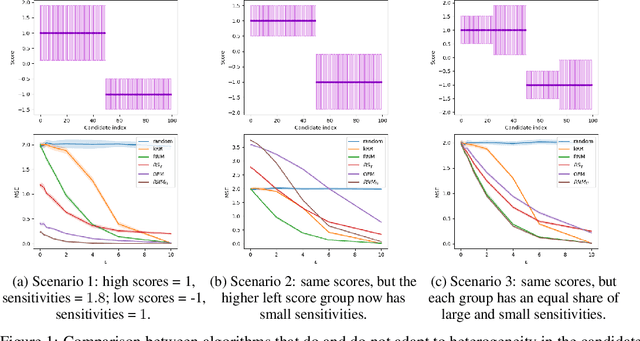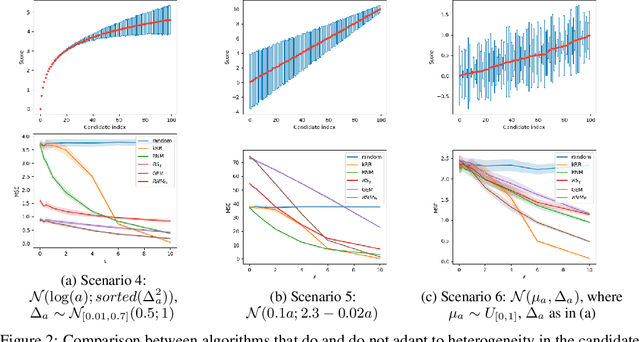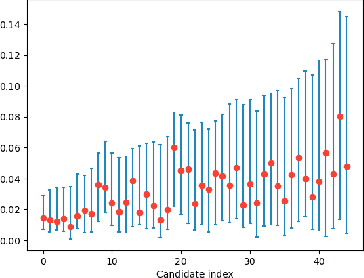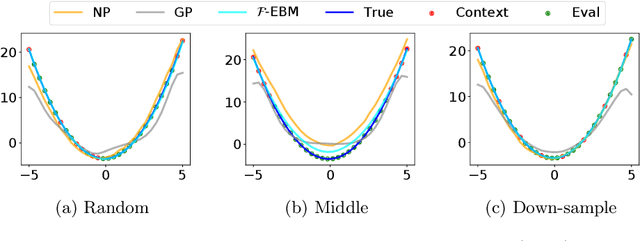Lorenz Wolf
Enhancing Diversity in Large Language Models via Determinantal Point Processes
Sep 05, 2025Abstract:Supervised fine-tuning and reinforcement learning are two popular methods for post-training large language models (LLMs). While improving the model's performance on downstream tasks, they often reduce the model's output diversity, leading to narrow, canonical responses. Existing methods to enhance diversity are limited, either by operating at inference time or by focusing on lexical differences. We propose a novel training method named DQO based on determinantal point processes (DPPs) to jointly optimize LLMs for quality and semantic diversity. Our approach samples and embeds a group of responses for each prompt, then uses the determinant of a kernel-based similarity matrix to measure diversity as the volume spanned by the embeddings of these responses. Experiments across instruction-following, summarization, story generation, and reasoning tasks demonstrate that our method substantially improves semantic diversity without sacrificing model quality.
Reward Model Overoptimisation in Iterated RLHF
May 23, 2025Abstract:Reinforcement learning from human feedback (RLHF) is a widely used method for aligning large language models with human preferences. However, RLHF often suffers from reward model overoptimisation, in which models overfit to the reward function, resulting in non-generalisable policies that exploit the idiosyncrasies and peculiarities of the reward function. A common mitigation is iterated RLHF, in which reward models are repeatedly retrained with updated human feedback and policies are re-optimised. Despite its increasing adoption, the dynamics of overoptimisation in this setting remain poorly understood. In this work, we present the first comprehensive study of overoptimisation in iterated RLHF. We systematically analyse key design choices - how reward model training data is transferred across iterations, which reward function is used for optimisation, and how policies are initialised. Using the controlled AlpacaFarm benchmark, we observe that overoptimisation tends to decrease over successive iterations, as reward models increasingly approximate ground-truth preferences. However, performance gains diminish over time, and while reinitialising from the base policy is robust, it limits optimisation flexibility. Other initialisation strategies often fail to recover from early overoptimisation. These findings offer actionable insights for building more stable and generalisable RLHF pipelines.
This Is Your Doge, If It Please You: Exploring Deception and Robustness in Mixture of LLMs
Mar 07, 2025Abstract:Mixture of large language model (LLMs) Agents (MoA) architectures achieve state-of-the-art performance on prominent benchmarks like AlpacaEval 2.0 by leveraging the collaboration of multiple LLMs at inference time. Despite these successes, an evaluation of the safety and reliability of MoA is missing. We present the first comprehensive study of MoA's robustness against deceptive LLM agents that deliberately provide misleading responses. We examine factors like the propagation of deceptive information, model size, and information availability, and uncover critical vulnerabilities. On AlpacaEval 2.0, the popular LLaMA 3.1-70B model achieves a length-controlled Win Rate (LC WR) of 49.2% when coupled with 3-layer MoA (6 LLM agents). However, we demonstrate that introducing only a $\textit{single}$ carefully-instructed deceptive agent into the MoA can reduce performance to 37.9%, effectively nullifying all MoA gains. On QuALITY, a multiple-choice comprehension task, the impact is also severe, with accuracy plummeting by a staggering 48.5%. Inspired in part by the historical Doge of Venice voting process, designed to minimize influence and deception, we propose a range of unsupervised defense mechanisms that recover most of the lost performance.
Private Selection with Heterogeneous Sensitivities
Jan 09, 2025


Abstract:Differentially private (DP) selection involves choosing a high-scoring candidate from a finite candidate pool, where each score depends on a sensitive dataset. This problem arises naturally in a variety of contexts including model selection, hypothesis testing, and within many DP algorithms. Classical methods, such as Report Noisy Max (RNM), assume all candidates' scores are equally sensitive to changes in a single individual's data, but this often isn't the case. To address this, algorithms like the Generalised Exponential Mechanism (GEM) leverage variability in candidate sensitivities. However, we observe that while these algorithms can outperform RNM in some situations, they may underperform in others - they can even perform worse than random selection. In this work, we explore how the distribution of scores and sensitivities impacts DP selection mechanisms. In all settings we study, we find that there exists a mechanism that utilises heterogeneity in the candidate sensitivities that outperforms standard mechanisms like RNM. However, no single mechanism uniformly outperforms RNM. We propose using the correlation between the scores and sensitivities as the basis for deciding which DP selection mechanism to use. Further, we design a slight variant of GEM, modified GEM that generally performs well whenever GEM performs poorly. Relying on the correlation heuristic we propose combined GEM, which adaptively chooses between GEM and modified GEM and outperforms both in polarised settings.
Augmented Modular Reinforcement Learning based on Heterogeneous Knowledge
Jun 01, 2023



Abstract:In order to mitigate some of the inefficiencies of Reinforcement Learning (RL), modular approaches composing different decision-making policies to derive agents capable of performing a variety of tasks have been proposed. The modules at the basis of these architectures are generally reusable, also allowing for "plug-and-play" integration. However, such solutions still lack the ability to process and integrate multiple types of information (knowledge), such as rules, sub-goals, and skills. We propose Augmented Modular Reinforcement Learning (AMRL) to address these limitations. This new framework uses an arbitrator to select heterogeneous modules and seamlessly incorporate different types of knowledge. Additionally, we introduce a variation of the selection mechanism, namely the Memory-Augmented Arbitrator, which adds the capability of exploiting temporal information. We evaluate the proposed mechanisms on established as well as new environments and benchmark them against prominent deep RL algorithms. Our results demonstrate the performance improvements that can be achieved by augmenting traditional modular RL with other forms of heterogeneous knowledge.
$\mathcal{F}$-EBM: Energy Based Learning of Functional Data
Feb 04, 2022



Abstract:Energy-Based Models (EBMs) have proven to be a highly effective approach for modelling densities on finite-dimensional spaces. Their ability to incorporate domain-specific choices and constraints into the structure of the model through composition make EBMs an appealing candidate for applications in physics, biology and computer vision and various other fields. In this work, we present a novel class of EBM which is able to learn distributions of functions (such as curves or surfaces) from functional samples evaluated at finitely many points. Two unique challenges arise in the functional context. Firstly, training data is often not evaluated along a fixed set of points. Secondly, steps must be taken to control the behaviour of the model between evaluation points, to mitigate overfitting. The proposed infinite-dimensional EBM employs a latent Gaussian process, which is weighted spectrally by an energy function parameterised with a neural network. The resulting EBM has the ability to utilize irregularly sampled training data and can output predictions at any resolution, providing an effective approach to up-scaling functional data. We demonstrate the efficacy of our proposed approach for modelling a range of datasets, including data collected from Standard and Poor's 500 (S\&P) and UK National grid.
 Add to Chrome
Add to Chrome Add to Firefox
Add to Firefox Add to Edge
Add to Edge